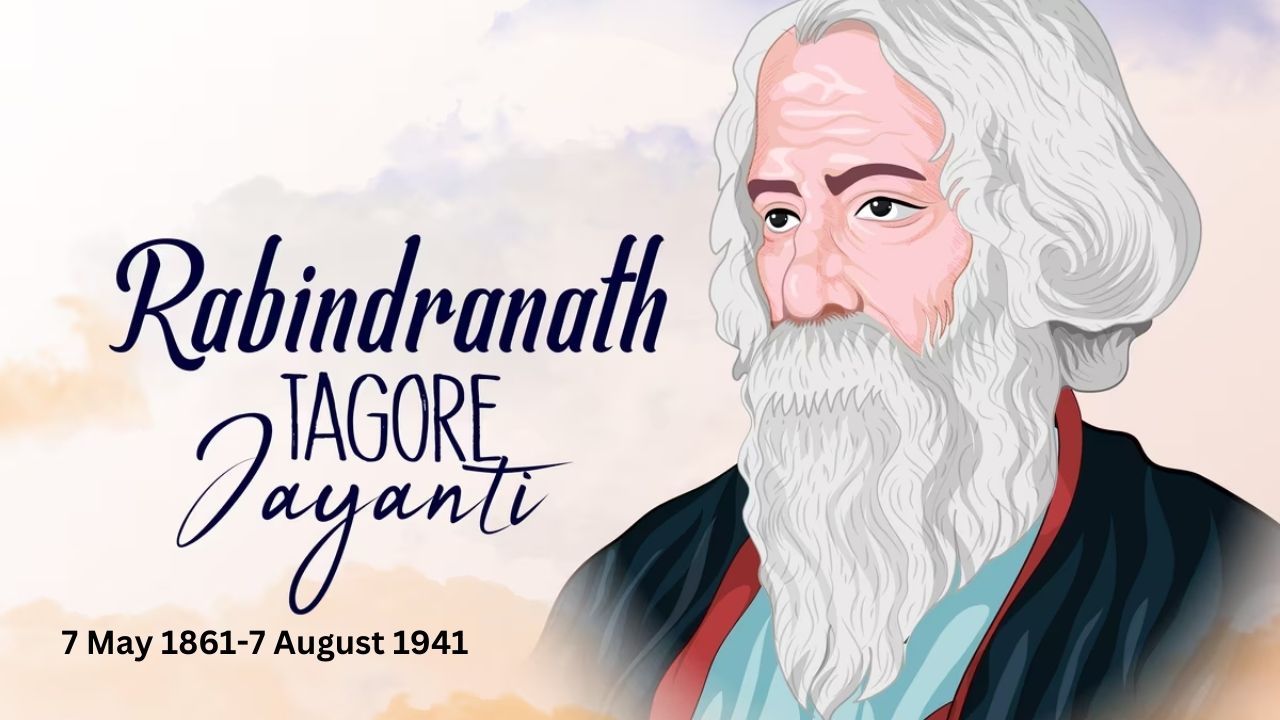A Brief Introduction to Ravindranath Tagore's Life:
Ravindranath Tagore, a luminary of Indian literature and culture, is celebrated annually on Guru Ravindra Nath Jayanti, marking the birth anniversary of this multifaceted genius. His contributions span literature, music, art, and social reform, leaving an indelible mark on the fabric of Indian society and beyond.
Born on May 7, 1861, in Calcutta (now Kolkata), Ravindra nath Tagore hailed from a prominent Bengali family. His father, Debendranath Tagore, was a revered philosopher and social reformer, and his mother, Sarada Devi, was a pious and compassionate figure. Growing up in such an intellectually stimulating environment, Rabindranath Tagore's early education was unconventional, which profoundly influenced his later works.
How is Ravindra Nath Tagore Jayanti Celebrated?
- Ravindra Nath Tagore Jayanti is celebrated with great fervor across India, especially in West Bengal, where Tagore's influence is deeply ingrained in the cultural ethos. The day typically begins with floral tributes at Tagore's statues and literary discussions about his life and works. Cultural programs, including musical performances, dance recitals, and theatrical productions, are organized to commemorate his legacy. Schools and educational institutions pay homage to Tagore through special assemblies and competitions centered around his literature and philosophy.
How Can You Celebrate?
- There are numerous ways individuals can celebrate Ravindra Jayanti. Reading Tagore's literary masterpieces, such as "Gitanjali," "Chokher Bali," and "Gora," offers a glimpse into his profound understanding of human emotions and societal dynamics. Organizing musical concerts featuring Tagore's songs, known as Rabindra Sangeet, is another popular way to honor his contributions to music. Engaging in artistic endeavors like painting or poetry inspired by Tagore's works fosters a deeper appreciation for his creativity and vision. Additionally, participating in social initiatives that align with Tagore's principles of universalism and humanism serves as a meaningful tribute to his legacy.
About Ravindranath Tagore:
- Ravindranath Tagore was not merely a literary figure but a Renaissance man whose influence transcended boundaries. He was the first non-European to be awarded the Nobel Prize in Literature in 1913 for his collection of poems, "Gitanjali." Tagore's literary prowess extended beyond poetry to encompass novels, short stories, essays, and plays, each reflecting his deep empathy for humanity and his unwavering belief in the power of education and enlightenment to effect social change.
- Apart from his literary pursuits, Tagore was an avid philosopher and social reformer. He established the experimental school, Santiniketan, which emphasized holistic education and celebrated the harmonious coexistence of nature and humanity. Tagore's vision for education transcended rote learning, emphasizing the development of critical thinking, creativity, and empathy among students.
Works of Ravindranath Tagore:
Tagore literary oeuvre is vast and varied, encompassing poetry, fiction, drama, and essays. Some of his notable works include:
- Gitanjali: A collection of poems that captures the essence of Tagore's spiritual journey and his reverence for nature.
- Chokher Bali: A novel that explores complex human relationships and societal norms in 19th-century Bengal.
- Gora: A novel that delves into issues of identity, nationalism, and religious tolerance, set against the backdrop of the Swadeshi movement.
- The Home and the World (Ghare-Baire): A novel that critiques nationalism and imperialism while exploring themes of love, friendship, and betrayal.
- Rabindra Sangeet: A vast repertoire of songs composed by Tagore, ranging from devotional hymns to songs celebrating the beauty of nature and human emotions.
Tagore works continue to resonate with readers worldwide, inspiring generations with their timeless wisdom and universal appeal.
Conclusion:
- Guru Ravindra Nath Jayanti serves as a poignant reminder of Ravindra nath Tagore's enduring legacy and his invaluable contributions to literature, music, art, and social reform. Through his profound understanding of human emotions and his unwavering commitment to universalism and humanism, Tagore continues to inspire and enrich lives across generations. As we commemorate his birth anniversary, let us not only celebrate his literary genius but also strive to embody the ideals of compassion, creativity, and social justice that he espoused throughout his life. Rabindranath Tagore's words resonate with timeless relevance, urging us to embrace the beauty of life and the interconnectedness of all existence.
FAQs:
Where was Ravindranath Tagore born?
- Ravindranath Tagore was born in Kolkata on May 7, 1861.
Which countries use the National Anthem composed by Ravindranath Tagore?
- The National Anthem composed by Ravindranath Tagore, "Jana Gana Mana," is used in India and Bangladesh. Additionally, Tagore's composition "Namo Namo Matha" was adapted as the National Anthem of Sri Lanka, although it is no longer in use as of my last update in January 2022.
On which day did Ravindranath Tagore die?
- Rabindranath Tagore, the Nobel laureate, passed away on August 7, 1941, at the age of 80.
How did Tagore died?
- Ravindra nath Tagore was diagnosed with severe uraemia and a blocked urinary bladder. Despite his reluctance, Dr. Jyotiprakash Sarkar and Dr. Bidhan Chandra Roy insisted on surgery, which took place on July 30, 1941. Unfortunately, complications arising from the surgery ultimately led to his death a week later, on August 7, 1941.
Why Ravindra nath Tagore is special?
- Ravindranath Tagore (1861 – 1941) is primarily renowned as a poet. In 1913, he made history by becoming the first non-European writer to receive the Nobel Prize for Literature.
We hope that you like this content and for more such content Please follow us on our social site and YouTube and subscribe to our website.
Manage your business cash flows and payable/receivables using our Bahi Khata App
